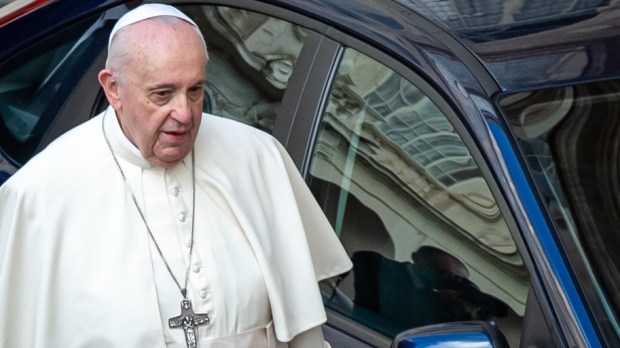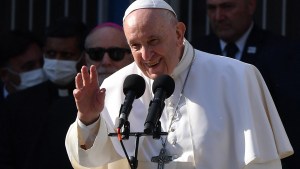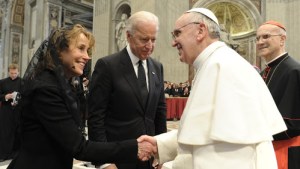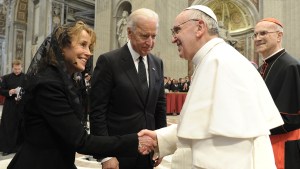Over a period of just a few hours on October 29, Pope Francis will receive in consecutive audiences important heads of state: Presidents Joe Biden (United States), Moon Jae-in (South Korea) and, on October 30, Prime Minister Narendra Modi (India).
President Joe Biden’s first visit
The first to be announced, Pope Francis’ meeting with the second Catholic president in U.S. history, Joe Biden, is expected to reopen the debate over “eucharistic coherence” that is ongoing within the Catholic Church in the United States. While there are those who call for Biden to be denied Communion because of his support for abortion, others warn of a “politicization of the Eucharist,” and note that the issue is misrepresented in the secular press, leaving the Church in a no-win situation.
Both leaders have seemed to want to break out of this polarization in recent weeks. On the one hand, Biden, while maintaining his pro-choice positions, recently appointed a pro-life ambassador to the Holy See. For his part, when asked about the issue last September, Pope Francis emphasized the issue from a pastoral perspective, even as he reiterated his exceedingly clear condemnation of abortion:
Abortion is more than a problem. Abortion is homicide. Abortion — there is no reading between the lines: Whoever has an abortion kills. …
The problem is not a theological problem, that’s simple. But it is a pastoral problem: how we bishops manage this principle pastorally.
The agenda of the Vatican-US meeting, announced by the White House, promises to be more diplomatic than social. Washington has announced that it intends to use the visit to discuss “working together” to promote respect for human dignity. The two are set to address issues on which Joe Biden and Francis seem to be able to agree, such as the pandemic, the climate crisis, and the fight against poverty.
A possible further tension could come up: the subject of China. The Biden administration seems to have aligned itself with that of Donald Trump, which started to arm wrestle with China and disapproved of the agreement on the appointment of bishops signed by the Vatican and China in 2019. This issue was also raised during the visit of Secretary of State Anthony Blinken last June. The latter’s approach proved to be much less confrontational than that of his predecessor Mike Pompeo.
The anticipated commotion surrounding the meeting already intensified the day before, as the Vatican cancelled plans for live broadcast of the two leaders greeting each other. Their private talks were never intended to be broadcast, per usual protocol for the Pontiff’s meetings with heads of state, but there had been plans for media to broadcast the moment of Francis and Biden greeting each other. The Vatican didn’t say why those plans changed.
The North Korean issue
On the same day, South Korean President Moon Jae-in’s meeting with Pope Francis is expected to address, once again, the preferred themes of Vatican diplomacy. The “Blue House”—the presidential residence in Seoul—has unveiled the major issues planned for this private audience: the pandemic, the fight against poverty, and climate change.
However, another issue on which both countries are working is expected to dominate media attention: that of relations with North Korea.
During his previous visit to the Vatican in 2018, President Moon Jae-in—who is strongly committed to the reunification of the Korean peninsula—opened a novel breach by transmitting to Pope Francis an oral invitation from Kim Jong-un, the supreme leader of the People’s Republic of Korea, to come to his country.
The Holy See welcomed the announcement but requested an official invitation, which has never arrived. This is due, among other things, to a rise in tensions resulting from the resumption of North Korean ballistic tests in the Sea of Japan in 2019.
Since then, however, the possibility of a historic trip of the Pope above the 38th parallel north has been repeatedly raised by the Catholic Church in South Korea as well as by the government of Moon Jae-in, especially through the unexpected warming of the dialogue between Donald Trump and Kim Jong-un.
On October 25, 2021, the spokeswoman for the South Korean Ministry of Unification stated that a visit by Pope Francis to North Korea, if it were to take place, would “greatly contribute” to the establishment of peace on the Korean peninsula.
However, the “North-politik” that the Holy See and Seoul seem to be pursuing appears so far to be far from successful, due to the many obstacles that stand in their way. First, there’s the unpredictable and opaque nature of the intentions of North Korea and its leader. Secondly, this project must take into account the interests of three key players in the North Korean issue: the United States, China, and Russia.
It should be noted that Moon Jae-in will meet his American counterpart a few hours after their respective visits to the Vatican. The Holy See could have the opportunity to play its traditional role of mediator in this issue in which the position of the Biden administration remains unclear.
Narendra Modi’s historic visit
Originally announced for October 29 by the Hindustan Times, a major Indian daily, this meeting was finally confirmed by the Vatican, but set for October 30. This first visit of the Indian Prime Minister to the Apostolic Palace will be particularly important for the Holy See because of the complex relationship between the Indian government and the country’s Christian communities.
According to the Aid to the Church in Need (ACN) Religious Freedom in the World Report 2021, Christians face significant hostility there. According to their study, the main driver of persecution in the peninsula is the rise of ethno-religious nationalism. The Prime Minister’s Bharatiya Janata Party, which advocates the defence of Hinduism—Hindutva—has made a number of hostile gestures towards some members of India’s Christian population in recent years.
The case of Jesuit priest Stan Swamy, who was involved in defending human rights in India and was accused of terrorism by the government, has crystallized the tensions. However, the death of the Indian priest in custody last July was not mentioned by the Holy See, which, somewhat like in China—even if the margin for discussion is much greater—seems not to want to give the impression of interfering in national affairs.
The Holy See could take advantage of Modi’s visit to capitalize on one of the few overtures he has made: the prospect of a trip to India. In January 2021, the Prime Minister told Indian cardinals that he intended to send an official invitation to the Pontiff, something he had long refused to do, especially when the Pope could have gone to India in 2017 during a trip to the region. However, nothing has yet been done, and for the time being, India has not been mentioned by Pope Francis among his possible destinations in 2022.
A call from home
Prior to the G20, Argentine President Alberto Fernández would also have liked to take advantage of his trip to Rome to meet his compatriot at the Vatican. However, the Holy See is said to have refused in order not to influence an imminent election. The Argentinean legislative elections are to be held on November 14, 2021.




